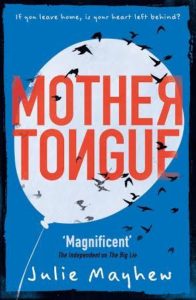 In the realm of adult publishing, historical fiction is defined as a story that takes place more than 50 years before the book’s publication. With children’s and young adult books, the definition of “historical” is anything that takes place before the year the target audience was born. Sharon Mayhew’s Mother Tongue, which takes place in Russia, in the cities of Beslan and Moscow in 2004, sits at the edge of historical and contemporary as it evokes a traumatic and its repercussions for the survivors.
In the realm of adult publishing, historical fiction is defined as a story that takes place more than 50 years before the book’s publication. With children’s and young adult books, the definition of “historical” is anything that takes place before the year the target audience was born. Sharon Mayhew’s Mother Tongue, which takes place in Russia, in the cities of Beslan and Moscow in 2004, sits at the edge of historical and contemporary as it evokes a traumatic and its repercussions for the survivors.
Seventeen-year-old Darya has become the main caretaker of her five-year-old sister, Nika, ever since the onset of their mother’s disabling post-partum depression. While Darya has had to put her life on hold while her classmates go to university, she makes sure Nika’s life moves forward. The novel opens with the first day of school, but on that day terrorists attack the school building, hold hundreds of children, teachers, and parents hostage. In the end, more than 300 hostages are killed, including Nika, while the rest of the horrified family watch from their apartment window that overlooks the school’s bombed gym.
Most of Mayhew’s novel, however, deals with the aftermath. Darya’s grief and guilt lead her to the pack of journalists covering the massacre, in the hope that they’ll take her away from Beslan and an arranged marriage with one of her father’s co-workers. Her two teenage brothers become part of a local militia that threatens anyone who looks different. Among the militia members is a sole teenage girl, Alana, a lonely, neglected youngster who latches onto Darya as a surrogate mother. But Darya’s dreams of escaping her small city and living in Moscow where no one knows her mean she will leave everyone behind and face challenges she never imagined.
Mayhew does an admirable job of showing the aftermath of tragedy – the anger and calls for revenge, the survivor’s guilt, and the impulse to escape and forget. The Western journalists who flood the town in search of a story exploit the traumatized locals, and even the most well-meaning end up doing more harm than good. The perpetrators of the massacre remain invisible, and in this way Mayhew avoids perpetuating the cycle of blame and revenge that she depicts, compellingly, in her portrayal of the teenage militia and lost girl Alana. The chapters set in Moscow depict the oligarchs, gangsters, and newcomers to the big city looking either to disappear, to strike it rich, or to do both at the same time. Set a decade later, this book – particularly its section in Moscow – would make an excellent companion to Katia Rania’s recently published Castles of Concrete.